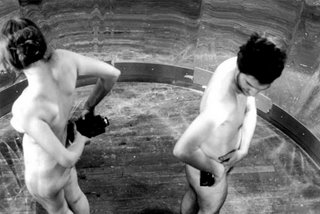MakerThinker: Don't Trust Craft

Dan Graham, Body Press (1970-1972)
I haven't been very clear about this MakerThinker thing. I see from Serena's comment that this could be misconstrued as an argument for craft.
Craft is about right and wrong, preserving tradition, not reinventing the wheel. The teaching of craft in art school tends to create artist-technicians who so clearly know what is right and what is wrong that they will never do it the really fucked up/interesting/revolutionary way. Craft dulls the potential MakerThinker. It creates false security and throws up barriers to understanding. Craft is conservative.
I TAed a sculpture class for Jennifer Pastor once. And my most important job was to hang out by the sculpture tech and make sure he didn't convince any of the students do it "the right way" or "the easy way". Technicians are expedient, and sculpture is rarely interesting when it is done expediently. The right way is often irrelevant. What Jennifer wanted was to get the students to find the way it needed to be done. This is MakerThinking, and it has nothing to do with learning how to weld, although it can involve welding.
The most expressive or smartest way to tackle a problem can really rankle what the craftsperson inside knows to be true. I fight all the craft I learned at my crappy provincial state school education as much as I use it.

3 Comments:
Hi Jordan,
Yes, the making is the thought process.
In this way, the Maker/Thinker is as much endebtted to Dan Graham or Chris Burden or Magdalena Abramovic as to a big-boy traditonal sculptor like David Smith.
Craft is not useless. I am such a mind-centric spaz that I don't think I ever would have learned how to pay attention without learning a specific craft. But that attention came at a huge cost. Craft is a monkey on my back, it gives me a rigid sense of right and wrong that forces me to stop prematurely, that keeps me from discovering.
Anyone who works in commercial art as both a creative and a technician knows intuitively that one activitiy requires a mind at play and the other requires a mind at work. The mind at work knows the rules and makes things happen. Everyone needs a mind at work to make coffee, set the microwave, drive to work. The mind at play discovers the new thoughts. It's risky. It might misbehave. It does wrong things right and right things wrong, and it has to be the boss if you want to get to something new.
this is gypsy_kat. i'm just too lazy to log in today.
Craft Shmaft, I say! i'm going to put my linguistic foot down on this one. craft is what you do when you are learning all the ways to throw a ball of lead at the wall. there is good craft and bad craft. the point i think you're trying to make is about care.. consideration.. there is enough work that's thought about to within an inch of its life, and then executed in a way that doesn't allow any resonance. at this point in art, things as disparate as crochet and explosives have become artistic media [don't get me started on information as media]. the ways in which we manipulate the world into artistic shape has to be as mutable as the ideas that inspire them in the first place. take the bricoleur: sometimes the zip-tie [cable-tie in some states..], while perfectly suited to its intended purpose, could be really useful as a toothpickorwhatever. the zip-tie could work well as a whatever, but it all hinges on HOW it's used. my point about craft is that it is alwyas there. in every gesture. and it relies deeply on context.
so how does that relate to our maker-thinker? the maker-thinker is focused on 'C' Craft as long as that knowlege or effect is desireable and relevant in context. otherwize [most of the time] maker-thinker thoughts are about 'c' craft, as in: how am i going to balance that bathtub on this water-cooler.
yes? no?
j
Post a Comment
<< Home